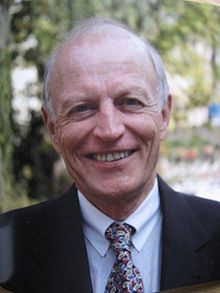Dieter Mahncke

Dieter Mahncke (born 1941 in South-West Africa) is a scholar of foreign policy[1] and security studies, and Alfried Krupp von Bohlen und Halbach Professor Emeritus of European Foreign Policy and Security Studies at the College of Europe.[2] He is the author of books and articles on European security,[3] arms control, German foreign policy, Berlin, US-European relations and South Africa.[4]
Education
Mahncke was born and raised in South-West Africa. After starting his studies at the University of Cape Town in South Africa, he transferred to the University of North Carolina at Chapel Hill where he received a B.A. in Political Science (1962). He holds an M.A. and a Ph.D. from the School of Advanced International Studies, Johns Hopkins University (1964, 1968), and a Habilitation from the Rheinische Friedrich-Wilhelms-Universität in Bonn (1974).
Career
1960 to 1990s
Mahncke was a Research Associate with the German Council on Foreign Relations (1968–1973), and Lecturer in Political Science at Mainz University (1969–1972) and Bonn University (1973–1974). He was Professor of Political Science at the University of the German Federal Armed Forces (Universität der Bundeswehr) in Munich (1974) and Hamburg (1975–1980). He was Vice President of the University of the German Federal Armed Forces in Hamburg 1977–1978.[5]
From 1979–1985 Mahncke was adviser to the German President and Deputy Chief of the Planning Staff in the Ministry of Defense until 1996. He was a Visiting Fellow at Brown University (1989) and a Senior Visiting Fellow at the European Union Institute for Security Studies (1992).[6]
1990s to present
From 1996 to 2010 Mahncke was Alfried Krupp von Bohlen und Halbach Professor for European Foreign Policy and Security Studies at the College of Europe in Bruges. He was Director of the Department of Political and Administrative Studies from 1996–2008, and from 2006–2010 the founding Director of the Department of EU International Relations and Diplomacy Studies. Prior to this Mahncke had been a visiting professor at the College of Europe since 1975, teaching both on the Bruges and Warsaw (since 1996) campus.
Mahncke has held visiting professorships in Germany (Halle), Belgium (Antwerp), Bulgaria (Sofia), Thailand (Bangkok) and the United States (Dartmouth, Middlebury, Duke, UNC).[7] He also taught at the Moscow State Institute of International Relations (MGIMO). From 1995–2010 he was Member of the Board of the Harris German Distinguished Visiting Professorship at Dartmouth College.[8]
References
- ^ Dieter Mahncke; Alicia Ambos; Christopher Reynolds. "European Foreign Policy: From Rhetoric To Reality?". Google ebooks. Google. Retrieved 13 May 2012.
- ^ "Who's who at the College of Europe?:Dieter Mahncke". College of Europe. College of Europe. Retrieved 23 May 2013.
- ^ Dieter Mahncke; Jörg Monar. "International terrorism: a European response to a global threat?". Google ebooks. Google. Retrieved 13 May 2012.
- ^ "Dr. Dieter Mahncke: List of Publications" (PDF). Dr. Dieter Mahncke: List of Publications. College of Europe. Retrieved 17 May 2012.
- ^ "About Prof. Mahncke". College of Europe. College of Europe. Retrieved 17 May 2012.
- ^ "Parameters of European security". Chaillot Paper - No10 - 01 September 1993. EU Institute for Security Studies. Retrieved 17 May 2012.
- ^ "Who's who at the College of Europe?:Dieter Mahncke". College of Europe. College of Europe. Retrieved 13 May 2012.
- ^ College "Harris Advisory Board". Dartmouth College. Retrieved 23 May 2013.
{{cite web}}: Check|url=value (help)
